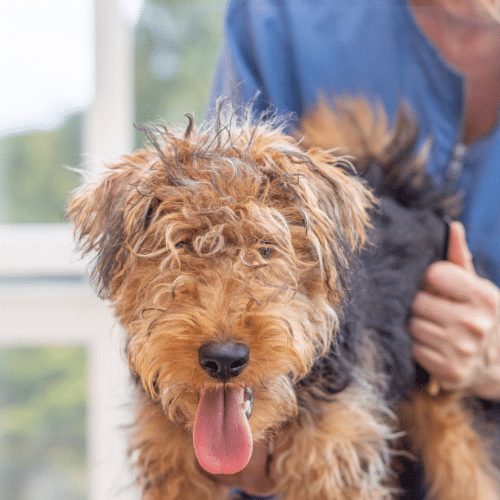Welsh Terrier
May 26, 2021 2021-06-04 11:11Table of Contents
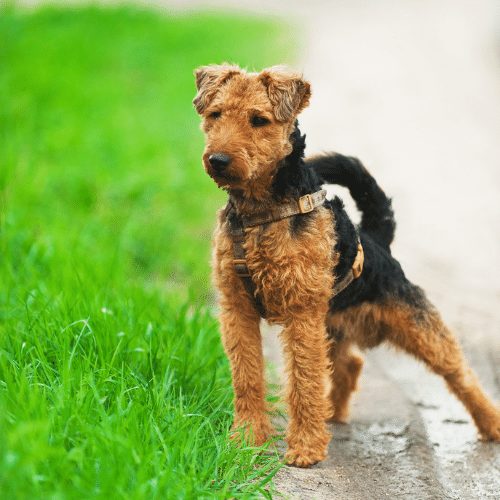
Origin and History of the Welsh Terrier
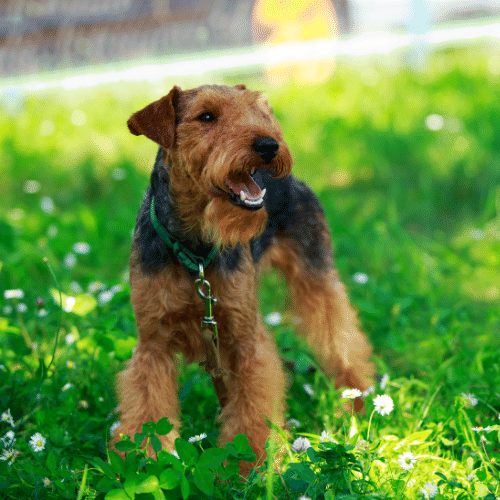
The Welsh Terrier is an old breed. As its name suggests, the first dogs were bred in Wales. They became popular in the middle of the 19th century.
The first individuals were bred for hunting rodents and foxes, but the dogs’ strength of character, loyalty, and endurance won their owners’ hearts. Due to their wonderful features, Welsh Terriers are now pets instead of serving as helpers at farms.
Since they require a serious commitment and they need their share of exercise, Welsh Terriers are less common dogs in the 21st century. In fact, the United Kingdom added them to the list of breeds that are at a high risk of dying out.
At the same time, this is one of the healthiest dog breeds in the world, as most pups are predisposed to just 2 medical conditions (glaucoma and lens luxation), compared to many other breeds.
Appearance of the Welsh Terrier
The Welsh Terrier is sturdy and medium-sized. Some might describe the dog as ‘stocky’, but looks can be deceiving. These pooches are full of energy and they will run around after animals in the park, if you let them.
A typical Welsh Terrier weighs between 20 and 22 pounds. According to the breed standard, the dog’s coat should be wiry and hard and a combination of black and tan. A black jacket going from the neck to the tail and partly down the dog’s thighs is another characteristic of the breed.
Welsh Terriers are somewhat similar to Airedale Terriers, but the breeds were developed in different places and at different times. Plus, the first is the oldest of the two.
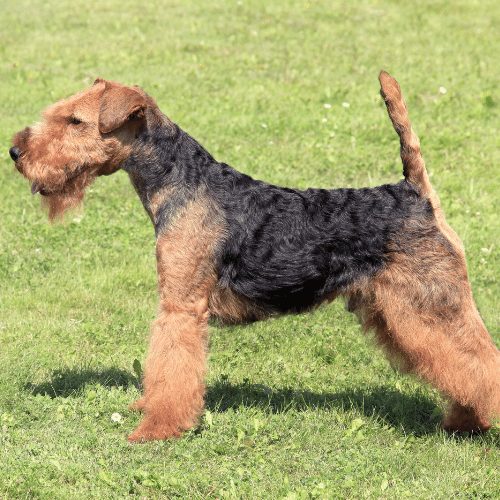

Temperament of the Welsh Terrier
Given that the breed was first developed to hunt independently, it wouldn’t be unfair to say that the Welsh Terrier has kept most of this character feature throughout the years. Most dogs can be stubborn and remarkably active, but they are also loyal and loving toward their owners.
The best thing about this breed is that it takes relatively well to its human companions, including children. While it might not be the same with other animals, you can trust your Welsh Terrier to protect your family thanks to a set of excellent instincts.
Most breeders and pet parents agree that this type of dog is less likely to be hyperactive, especially when compared to other terriers. In the hands of the right person, a Welsh Terrier can be happy and live a long life, but every puppy has to be socialized in order to prevent aggression toward other animals.
Since they love to bark, these dogs might be less suitable pets for people living in apartments.
Do Welsh Terriers Bark A Lot?
Welsh Terriers will bark quite a bit. Like all Terriers, they have an opinion about everything, and they are not afraid to share it!
Not every Welsh Terrier will be an incessant barker, but be prepared for some “talking back” from your dog. While it is possible to train dogs to bark a little bit less, it is unreasonable to expect that you can train your Welsh Terrier to never bark. It is just in his breed!
Are Welsh Terriers Cuddly?
Welsh Terriers can be great cuddle companions, once they have gotten all their energy out! They like to curl up with their owner and have a surprising love of everything that’s warm and comfortable. You are likely to find your dog in the biggest dog bed in the warmest spot in the house! Likewise, he will love to sleep on your lap or next to you in front of a fireplace.
Welsh Terrier Health and Care
Eye health problems are more common in this dog breed. It’s widely known that Welsh Terriers tend to suffer from glaucoma and lens luxation. This is why getting a puppy from a reputable breeder that can provide a certificate according to which the dog’s parents have good eye health is paramount.
Some Welsh Terriers can develop hyperthyroidism and obesity as they grow old. Several other health issues that can affect these dogs are the following:
- Hip dysplasia
- Addison’s disease
- Allergies
- Epilepsy
These are relatively uncommon compared to the eye health concerns that we have mentioned.


Grooming
Although this breed might look like it does not need a lot of effort in the way of grooming, it does need to have its coat trimmed every six to eight weeks. Weekly brushing can prevent matting and can keep the double coat that characterizes the Welsh Terrier in top shape.
Since some dogs might not like to be groomed regularly, it’s important to get them accustomed to it since they are young.
The rest of the grooming routine is standard for most dog breeds, such as brushing your pup’s teeth with a vet-approved toothpaste and trimming the nails every several weeks.
Do Welsh Terriers shed hair?
No – they do not shed. Your dog will not leave hair around the house, making this breed an excellent choice for every owner who is looking for a non-shedding dog. But make no mistake: This does not mean that your dog won’t need to be brushed or handstripped.
Training Your Welsh Terrier
This dog breed is full of energy and reacts best to fun training methods. So long as there is something to chase around and a reward to get at the end of the session, you’ll see that your Welsh Terrier is happy.
As is the case with other terriers, obedience training is the most important part of a training routine. Short training sessions packed with more than enough rewards and containing varied activities offer the best results. Positive reinforcement can make a Welsh Terrier more eager to please.
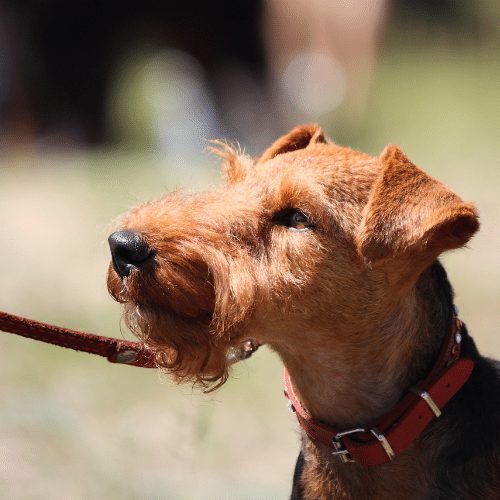
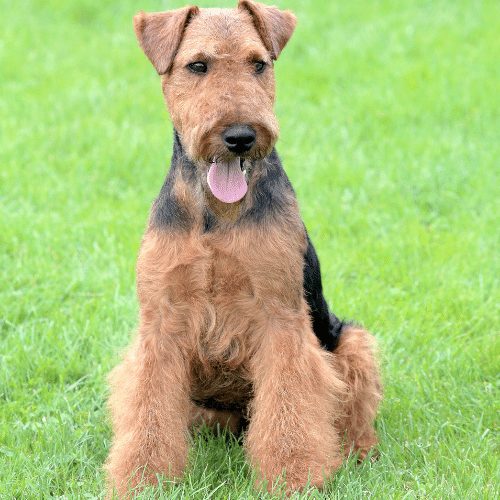
Deciding on a Welsh Terrier
All terriers are full of energy, and the Welsh Terrier is no exception. Compared to others, this breed is more sensible and steady, but it can still take a toll on people who haven’t cared for dogs before. Keep in mind that the Welsh Terrier can get distracted by critters and will go chasing around cats if it has the opportunity.
Getting a Welsh Terrier puppy comes with plenty of responsibility since you will be caring for your canine companion for at least 10 years. It’s not uncommon for some dogs to live for as many as 14 and even 15 years.
To thrive, Welsh Terriers have to get at least 30 to 60 minutes of exercise every day. Ideally, they should have access to the outdoors since they love it so much. That’s why they are highly recommended for people who have houses with sizable yards.
Get in touch with a Welsh Terrier breeder in your area and ask them whether they might let you come visit the kennel. You could also join several social media groups where Welsh Terrier parents can give you advice or even organize meetups.
A Welsh Terrier is not the right dog for you if:
- You don’t have enough time for walks or spending time outdoors with your dog
- You can’t handle stubbornness and mischievous behaviors
- You don’t want a dog that barks a lot
- You want a pooch that can be left alone for many hours every day
A Welsh Terrier is the right dog for you if:
- You want a dog that’s full of energy, loving, and loyal
- You’re looking for an excellent watchdog
- You want a low-shedding dog breed
- You need a canine friend that gets along well with other dogs and animals

Finding A Puppy Breeder
Welsh Terriers are predisposed to a number of genetically transmitted health conditions, such as glaucoma, dry eye, cataracts, and lens luxation. For this reason, the first thing to ask a breeder would be whether they can provide you with a Canine Eye Registration Foundation for the puppy’s parents (dated within the past 12 months).
This dog breed can also develop patellar luxation and allergies. An honest and responsible breeder will make you aware of this risk rather than trying to hide it. Try to look for some Welsh Terrier breeder reviews before making your final choice.
Questions for your breeder
- How long have you been breeding Welsh Terriers for?
- Is this the only dog breed you specialize in?
- Are the puppies vaccinated and dewormed?
- Do you have any references?
- Are the puppy’s parents in good health?
How much is a Welsh Terrier Puppy?
Getting a Welsh Terrier puppy from a breeder can be very expensive. Prices can range from $1,000 to as much as $4,000 depending on how reputable the breeder is and if the puppy’s parents are in great health and have won competitions. Excellent breeding comes at a higher cost, so some puppies can cost as much as $9,000.
However, the average cost of a standard Welsh Terrier puppy is anything between $600 and $1,000. Caring for your pooch during the first year of life can set you back around $2,000, but the yearly cost drops to about $700-$1,000 a year after that. This includes procedures such as neutering or spaying, various vet bills, deworming medications, vaccines, and more.

What Welsh Terrier Owners Say:

The breeder I got her from told me that Welsh Terriers aren’t that great with children, but I can say that she’s head over heels with my niece, the only kid she interacted with. I love Wendy to pieces, but I have to admit that she can be a lot of work for a first-time dog owner.

He’s a very handsome boy, and to some extent, we’re sorry that we aren’t going to use him for breeding. If you’re looking for a sweet, happy, and energetic dog that gets all of the boredom out of your life, we definitely recommend trying a Welsh Terrier.

